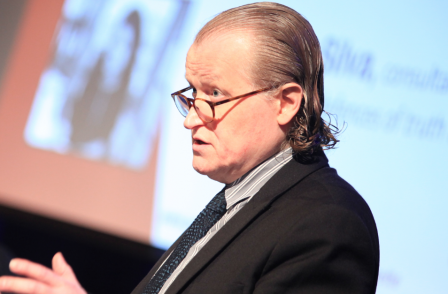
A leading media lawyer has said that police use of the Regulation of Investigatory Powers Act to secretly obtain journalists' phone records is "completely illegal" and that he knows of "a couple of cases" where it has happened.
Gavin Millar QC was speaking at the Protecting the Media Conference law conference in London. He is currently working on a European Court challenge to stop the UK Government spying on journalists and their sources.
Millar said he believes UK police are now secretly obtaining journalists' phone records "without compunction" because the media has been so successful at resisting production orders for journalistic material made under the Police and Criminal Evidence Act (PACE).
PACE requires officers to argue the case for handing over journalistic material before a judge, whereas RIPA orders are approved internally at the police force in question.
Earlier this month, the Met Police report into Operation Alice revealed that the force had obtained the phone records of The Sun and of the paper's political editor in order to find and sack three police officers accused of leaking information about the Plebgate affair – even though the Crown Prosecution Service said the officers had no case to answer.
Millar, of Doughty Street Chambers, believes police have begun using RIPA to obtain information about journalists “without compunction” after failing to take the “excluded material test” – which includes journalistic material – out of the PACE Act.
Millar said of the police use of RIPA to obtain journalists’ phone records to find confidential sources: “It’s completely illegal under article 10 [of the European Convention on Human Rights]… a violation of the article 10 [freedom of expression] rights of the journalist and the news organisation.
“But the evidence suggests they have started to do this without compunction – they’ve done it in a couple of cases I’ve been involved in.
“And I think what’s happened over the last few years is we’ve been so effective in litigating production orders, closing off production orders by forcing judges through judicial court decisions to strictly apply the access conditions in article 10.”
He highlighted the fact that the Metropolitan Police in its submission to the Leveson Inquiry called for the judge to make a recommendation “to take the excluded material test out of PACE, and to make it easier for the police to get access to confidential journalistic material”. Millar said: “That hasn’t happened yet, but no doubt there is a risk of that.”
Millar said: “Having failed to get the change they wanted through Leveson, it’s dawned on them that the quick and easy way now is to do it under chapter two part one [of RIPA].”
 Press Gazette asked the Met Police for a comment on Millar's suggestion that it had acted illegally. Press Gazette also highlighted the fact that more than 700 people have now signed the Save Our Sources petition calling for urgent action to stop public authorities using RIPA to obtain the phone records of journalists without the permission of a judge.
Press Gazette asked the Met Police for a comment on Millar's suggestion that it had acted illegally. Press Gazette also highlighted the fact that more than 700 people have now signed the Save Our Sources petition calling for urgent action to stop public authorities using RIPA to obtain the phone records of journalists without the permission of a judge.
A spokesman reissued a statement issued on 9 September about the Operation Alice investigation: "As part of this investigation the telephone data was applied for and authorised under the Regulation of Investigatory Powers Act (RIPA).
"In order to obtain such an authority under RIPA officers must demonstrate that it is proportionate, legal and necessary.
"As per legislation the application was submitted to a superintendent – who was independent from the investigation team.
"RIPA was the most appropriate and lawful means of obtaining this data that was essential to progressing a criminal investigation into allegations of corruption, specifically that police officers were conspiring to bring down a Cabinet Minister."
The Met Police has so far declined to reveal how many times it has used RIPA to obtain the phone records of journalists and news organisations.
Email pged@pressgazette.co.uk to point out mistakes, provide story tips or send in a letter for publication on our "Letters Page" blog
